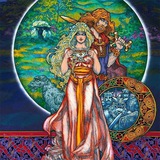📖 Ancient Restoration
31 Oct 2021 19:07
Early 20th century Halloween.
Читать полностью…
📖 Ancient Restoration
31 Oct 2021 18:59
Oct 31: #Celtic holiday of Samhain, or "summer's end", is celebrated; a night where the dead are unleashed from the Otherworld to roam ours.
Читать полностью…
📖 Ancient Restoration
18 Aug 2021 19:32
A two-hour docu-drama on the murders and the trial can be seen on the TG4 Player:
https://bit.ly/3AJMruq
Читать полностью…
📖 Ancient Restoration
18 Aug 2021 19:25
The murders themselves were horrific, and the true culprits were never found.
On having the verdict translated, Seoighe pleaded "Níl mé ciontach", meaning "I am not guilty".
James Joyce called him a "bewildered old man, left over from a culture which is not ours, a deaf-mute before his judge ... a symbol of the Irish nation at the bar of public opinion."
"Táim ag imeacht." - the last words of Seoighe before his execution by hanging.
17 August 1882 - the brutal shootings and bludgeonings of John, Micheál, Brighid, Mairéad and Peigí Joyce.
Читать полностью…
📖 Ancient Restoration
18 Aug 2021 19:21
17th August 1882, five members of the Joyce family were murdered in Mám Trasna, Co. Mayo.
The ensuing prosecution of Maolra Seoighe, an innocent man, is infamous in legal history. Seoighe was executed for the murders as he could not defend himself in an English-speaking court.
Читать полностью…
📖 Ancient Restoration
27 Jun 2021 16:39
1900 photo of Youghal Strand in Cork. Youghal is situated on the estuary of the River Blackwater, in the past, was militarily and economically an important seaport town.
Читать полностью…
📖 Ancient Restoration
27 Jun 2021 16:27
Fr Browne’s image of a Traveller family in Saggart, South Dublin in 1925.
Читать полностью…
📖 Ancient Restoration
27 Jun 2021 16:20
Castletownshend, Cork in 1910.
Coloured and restored.
Читать полностью…
📖 Ancient Restoration
20 Jun 2021 14:23
The Baltimore captives included 33 adult women, 54 boys and girls and 20 adult men. At most three were eventually ransomed years later. The men mostly were consigned to be galley slaves, sometimes never setting foot on land again. The women and female children almost invariably were sold into sexual bondage. Adolescent males were often castrated and sometimes also raped, as is apparently still the fate of males enslaved in Afghanistan and other Islamic countries.
Читать полностью…
📖 Ancient Restoration
20 Jun 2021 14:10
Most of those abducted were part of an English settlement which had been established in the middle of a region that was part of the Ó Drisceóil clan territory. It was a part of the violent colonisation of that part of Ireland which had resulted in the victory of the English in the Nine Years War that ended with the Battle of Kinsale in 1601.
Читать полностью…
📖 Ancient Restoration
02 Apr 2021 15:38
April 1st 1914 Cumann na mBan was established in Wynn's Hotel, Dublin. Their chief aims were to:
Advance the cause of Irish liberty
Organise Irish women in the furtherance of that objective
The role they played was vital in achieving Irish independence.
Читать полностью…
📖 Ancient Restoration
02 Apr 2021 15:31
Tobernalt Holy Well in Sligo - A site of worship since the 5th century, Catholics risked their lives in Penal times to hear Mass said at this blessed well.
Читать полностью…
📖 Ancient Restoration
27 Feb 2021 17:53
February 1st is the Feast of Saint Brigid of Kildare (Cill Dara, church of the oak), one of Ireland's patron saints.
Known as "the Mary of the Gael", Brigid was born in Faughart/Fochart, north of Dundalk, County Louth to Brocca, a Pictish slave who was baptised by Saint Patrick. Brigid herself was thus born into slavery.
During her childhood, it is said she performed several miracles, such as healing and feeding the poor. One account details how she gave away all of her mother's butter store, only for it to be replaced thanks to Brigid's prayers.
Dubhthach, a chieftain of Leinster, was her father. He grew aggravated with her and took her to the King of Leinster, Crimthann mac Énnai, to sell her. While he was in conversation, Brigid gave away his sword which was adorned with jewelry to a beggar so that he could barter it for food. Crimthann recognised that this was a holy child he had been delivered, and instead convinced Dubhthach to grant her freedom.
Читать полностью…
📖 Ancient Restoration
14 Feb 2021 21:15
The enjoining of hands around symbols of fertility is impressed deeply in the Irish psyche. Whether it's the modern heart or ancient cord.
Читать полностью…
📖 Ancient Restoration
02 Jan 2021 23:17
The Irish nationalist slogan 'Tiocfaidh ár lá' (Our day will come) is a modern form of the prophetic expectation of Gaelic resistance.
Читать полностью…

 933
933